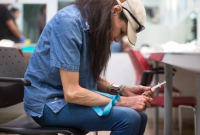Support strong Canadian climate journalism for 2025
Jordan McBain Miller was just 25 when he died in 2014. The young man from Pender Island, B.C. had recently started his own business installing wood stoves. He injured his back while working and was prescribed oxycodone for the pain.
Miller, who struggled with substance use when he was 19, became addicted within weeks of starting the pills. He went through detox, but came out with no support or counselling. He relapsed, obtained prescription painkillers from a number of walk-in clinics, and eventually overdosed from a lethal combination of drugs.
His mom, Leslie McBain, funnelled her grief into a new life of speaking out. She co-founded Moms Stop the Harm, an advocacy group for families who have lost loved ones to drug overdoses. That group is one of many – including cities, public health departments, politicians and the federal NDP leader – calling for the decriminalization of possession of small amounts of all drugs.
In August, 98 people in B.C. died of suspected drug overdoses and this year 972 have died, most of those from fentanyl. The province declared a public health emergency in April 2016.

Although Miller didn’t die from fentanyl, he exemplifies many of the traits common to the people dying in B.C. every day from opioid overdoses. Most are men who have never married, who have a history of pain and used health services in the year before they died. Many work in either trades or transportation.
Substance use cost the country $38.4 billion in 2014, $3.5 billion of which was from opioid use, the Canadian Centre on Substance Use and Addiction found. Among the costs are lost productivity, heath care, and criminal justice.
Something’s got to change.
Some say decriminalization, a federal government matter, would ease the crisis. But what exactly does decriminalization mean? Experts agree that drugs would still be illegal, but possessing small amounts of drugs would no longer be a criminal offense.
Portugal did this in 2001 and now directs people who are caught into treatment, rather than the criminal justice system. That means fewer criminal charges, but it has also meant fewer deaths. Just 27 people died from overdoses in Portugal in 2016. In B.C., 993 died.
Drugs in B.C. are becoming more lethal
As more and more drugs on the street are laced with fentanyl, people are becoming addicted to fentanyl itself and drugs are getting more lethal all the time, said Judy Darcy, B.C.’s minister of mental health and addictions.
Darcy acknowledges the success in Portugal, and says the most significant measure was to connect people to treatment and other social supports like housing and employment.
She insists B.C. is “working overtime” on getting those supports in place and that the province, which led the way with needle exchanges and safe injection sites, will continue to “push the envelope” on drug policy, including some new policing ideas.

For McBain, decriminalization and allowing addicts access to a legal, regulated supply are an obvious next step.
“We know that these two moves the feds could make would go a very, very long way to solving this problem, stopping the deaths, stopping the stigma, leading to recovery,” said McBain, who is also family engagement lead at the B.C. Centre on Substance Use. “It’s not really decriminalizing drugs, it’s decriminalizing the people who use illicit drugs for personal use,” she said.
Drug charges lead to stigma, which stops people from seeking help and could be a contributing factor to the high number of fatal overdoses that happen when people are alone.
“Criminalizing them has absolutely zero positive effect. It doesn’t stop addiction,” said McBain.
Decriminalization of drugs would be “great first step,” said Kora DeBeck, research scientist at the B.C. Centre on Substance Use and an assistant professor in the school of public policy at Simon Fraser University.
For one thing, it would mean people caught with drugs would not go to jail, which would reduce stigma against them. When drugs users are put in jail, it has been shown that drug use continues in even riskier ways, such as needle sharing, DeBeck said.
When the person comes out of jail, their tolerance level has changed, placing them at higher risk of fatal overdose. They can also lose their housing and connections to community.
Decriminalization should be followed up with regulation, to ensure not only a safe drug supply, but also that the marketing of illicit drugs is done in a way that promotes public health, DeBeck said.
Canada signs on to renewed U.S. war on drugs
Meanwhile, Canada appears to be going in the opposite direction. At the end of September, the Globe and Mail reported that Canada signed onto a U.S.-led renewal of the war on drugs that focuses on criminalization and law enforcement. Leaders of several other countries suggested that Canada and Mexico may have signed onto the renewal reluctantly, because of pressure over trade talks with the Trump government.
When asked about this move, Health Canada spokesperson Maryse Durette said, “Canada is committed to working with our U.S. colleagues to identify opportunities for collaboration as our countries continue to address the growing crisis of opioid-related overdose and death.”
Canada will also support the implementation of a 2016 United Nations resolution, which Durette said takes a more balanced approach, including human rights and public health.
Durette confirmed that Canada is not considering decriminalizing drugs other than cannabis, but said the government is committed to using a public health approach to address the opioid crisis.
Since the federal government doesn’t seem amenable to decriminalization, McBain advocates for a “de facto” decriminalization, in which police simply leave people alone who are caught in possession of drugs.
Readers might think that’s not all that different from how things are on B.C. streets today, but statistics from the B.C. Solicitor General show the number of people charged with cannabis possession – about 2,500 – in 2007 was basically identical to the number charged in 2016. The number of people charged with possession of cocaine dropped significantly, while the number of people charged with possession of heroin and other drugs went up.
Just last month, one month before recreational cannabis is to be legalized across the country, police in Vancouver seized cannabis that was being dispensed as an opioid replacement in the Downtown Eastside.
B.C. can’t decriminalize on its own
Decriminalization of drugs falls under federal jurisdiction, so even if B.C. wanted to go that route, it couldn’t go it alone.
“It is still illegal and the federal government has no appetite at the present time to make any changes, so really for British Columbia, we are doing everything we can to provide the widest possible range of options for people, putting new tools in the tool box constantly,” Darcy said.
That means connecting people to treatment, providing housing and other supports, but most importantly, it means trying a new approach in policing, Darcy says.
“One of the most exciting ways, one of the most innovative ways, is some of the work we are actually doing with police,” she said. “I’m hearing a lot of interest from police that the current approach is not working. I can’t tell you how many police chiefs have said to me, ‘we’re not going to arrest our way out of this crisis.’”
There are at least three new projects underway in B.C. where police, instead of arresting people they catch with drugs, are connecting them with treatment, Darcy said. The programs are in Abbotsford, Vernon and Vancouver.
Those projects sound like they could be tiny first steps towards a “de facto” decriminalization as called for by advocates like McBain. If they’re successful, perhaps they will be replicated across the province, putting B.C. once again at the forefront of drug policy. If they’re accompanied by ample access to treatment and other supports like housing and counselling, we could be onto something. And maybe, just maybe, it is what’s needed to save thousands of lives.
Tracy Sherlock writes about B.C. politics for the National Observer. Send story tips to [email protected]






Comments
"Decriminalizing the people who use illicit drugs for personal use," like Portugal is doing is the way to go. When anyone, let alone a young healthy person, becomes "handicapped" it is emotionally debillitating. I have severe arthritis, and am struggling with sudden pain, loss of dignity, issues of self-worth and self-confidence, but I'm 70, and I'm lucky that I have allergies and sensitivities to most drugs. If I was Jordan's age, and had just started a business that required physical strength and agility, and there were drugs that helped, I don't know what I would have done. I'm sorry that he's gone, and I applaud Leslie antidote to her grief. This article is very well written!
Thank you for reading, Suzanne!